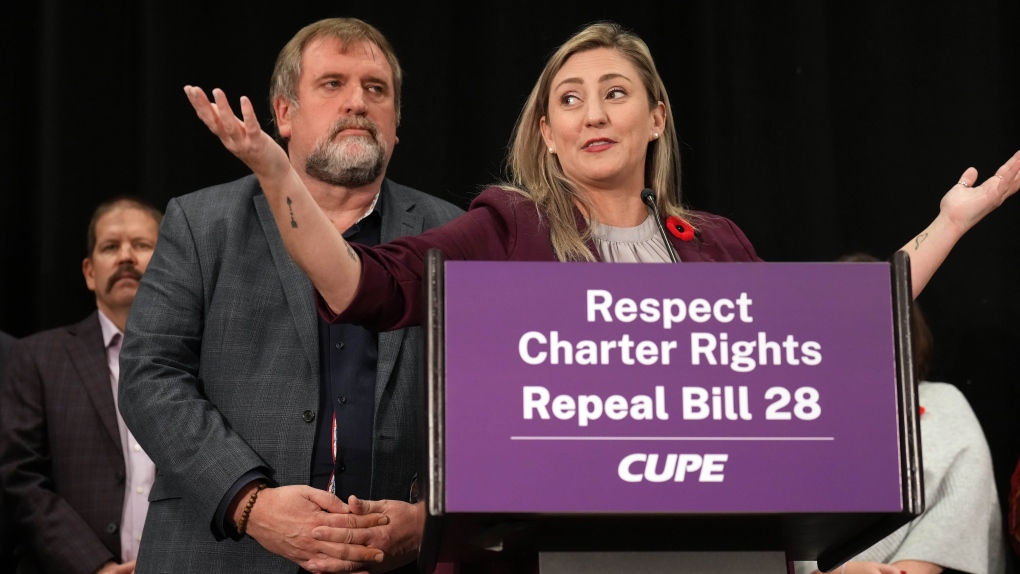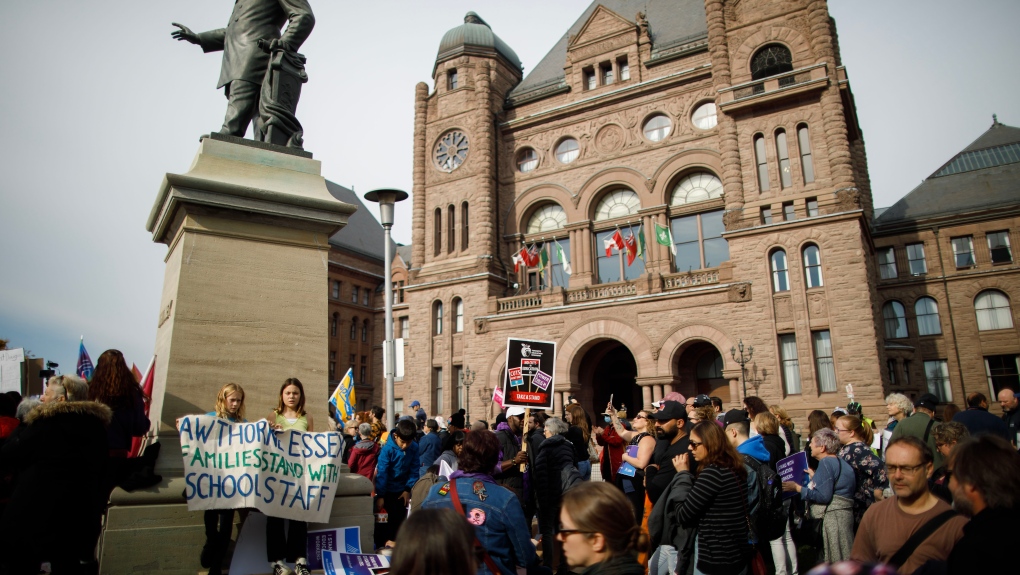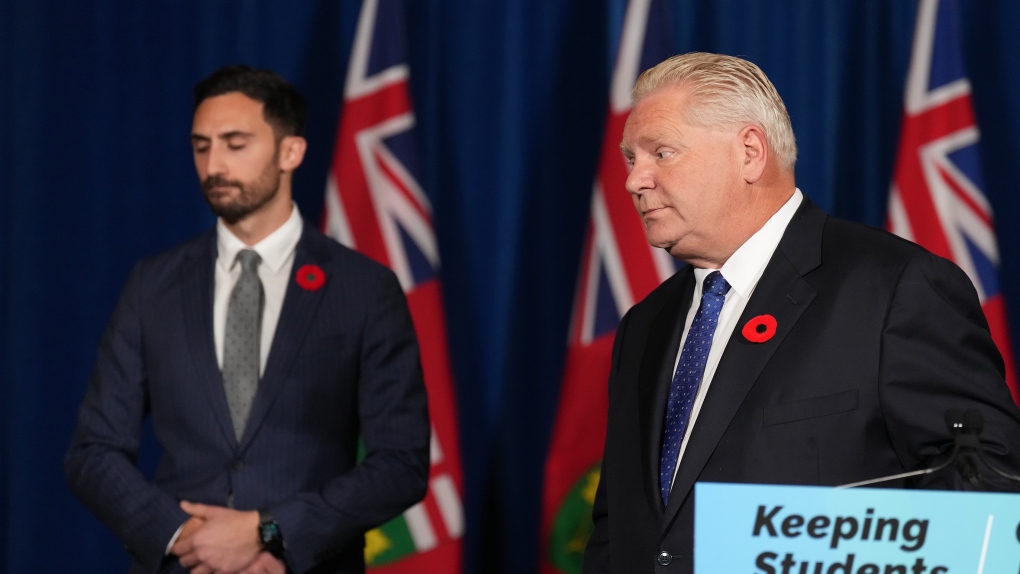Ontario education workers return to the negotiating table: What happens next?
The Ontario government has “blinked” and called off legislation that limits the ability of 55,000 education workers in the province to legally strike.
With that, the head of the Canadian Union of Public Employees’ (CUPE) Ontario School Board Council of Unions has said that those workers will return to the job on Tuesday, effectively putting an end to the job action.
- Download our app to get local alerts on your device
- Get the latest local updates right to your inbox
Now, the government and CUPE will return to the negoiating table.
This is what happens next.
BARGAINING RIGHTS ARE ‘INTACT AGAIN’: CUPE
Laura Walton, president of CUPE's Ontario School Board Council of Unions, said Monday that because the government walked back Bill 28, education workers’ bargaining rights are “intact again.”
“This is just the beginning. We haven't spent our leverage. Our leverage is just getting started,” Walton said.
She said the union will now return to the negotiating table with "open minds" and "open hearts."
“And we call on the government to do the exact same,” Walton said.
 CUPE-OSBCU president Laura Walton, right, answers a question as CUPE president Mark Hancock looks on during a press conference in Toronto on Monday Nov. 7, 2022. THE CANADIAN PRESS/Nathan Denette
CUPE-OSBCU president Laura Walton, right, answers a question as CUPE president Mark Hancock looks on during a press conference in Toronto on Monday Nov. 7, 2022. THE CANADIAN PRESS/Nathan Denette
CUPE members have been without a collective agreement since Aug. 31 and the issue of pay remains at the heart of the negotiations.
Those workers had been arguing for an annual 11.7 per cent salary increase over four years. The union said last week that their latest offer was about half of what was originally proposed.
After negotiations fell apart, the government passed Bill 28 which invoked the notwithstanding clause to restrict workers’ right to protest. This consequently locked members into a deal that included a 2.5 per cent increase in salary for those who make less than $43,000 annually, and a 1.5 per cent increase for everyone else.
Following a two-day walkout, the Ford government offered to rescind that legislation if CUPE agreed to end their strike, which they did hours later at a news conference in Toronto.
CUPE National President Mark Hancock was in attendance at Monday’s news conference and called Bill 28 a “direct threat to workers’ rights and to the Charter rights of all Canadians.”
“[Education workers] went out on a political protest. They brought their message and their anger to more than 100 sites across this province. They took on the Ford government and the government blinked,” he said.
IS CUPE STILL IN LEGAL STRIKE POSITION?
Yes.
On Oct. 7, the union requested what’s known as a “no board” report which made clear their intention to strike after talks broke down at the negotiating table.
A conciliator issued that report on Oct. 17 and put CUPE in legal strike position as of Nov. 3.
The union does not have to re-request a “no board” report if it wants to strike again, but would have to give a notice of five days of their intentions to do so.
“We are still in a legal position to strike, we would have to serve a five day notice that is what's required. So no, we don't have to reset the box,” Walton said.
 CUPE Ontario members and supporters wave signs and flags as they demonstrate outside of the Queen's Park Legislative Building in Toronto, Friday, Nov. 4, 2022. THE CANADIAN PRESS/Cole Burston
CUPE Ontario members and supporters wave signs and flags as they demonstrate outside of the Queen's Park Legislative Building in Toronto, Friday, Nov. 4, 2022. THE CANADIAN PRESS/Cole Burston
COULD CUPE WORKERS GO ON STRIKE AGAIN?
Yes.
Walton said if the union chooses to do so, 55,000 of its workers could once again walk off the job if talks with the government fall apart “because that is the right of all workers in negotiation and in free collective bargaining.”
COULD FORD USE THE NOTWITHSTANDING CLAUSE AGAIN?
Yes.
Premier Ford was asked on Monday, prior to CUPE’s announcement of their intentions to return to work, if he would pledge to not use the notwithstanding clause or Section 33 of the Charter of Rights and Freedoms again in a labour dispute, but did not commit to an answer one way or another.
“I’m not going to answer hypothetical questions,” he said.
Ford added that he “doesn’t like” using Section 33 and called CUPE’s first negotiating position “absolutely ridiculous.”
 Ontario Premier Doug and Education Minister Stephen Lecce leave after a press conference at Queen's Park in Toronto on Monday Nov. 7, 2022. FTHE CANADIAN PRESS/Nathan Denette
Ontario Premier Doug and Education Minister Stephen Lecce leave after a press conference at Queen's Park in Toronto on Monday Nov. 7, 2022. FTHE CANADIAN PRESS/Nathan Denette
For context, Ford previously used the notwithstanding clause in June of 2021 to restore parts of the Election Finances Act that had previously been declared unconstitutional, enforcing a rule that third parties could only spend $600,000 on advertising in the 12 months before an election is called.
Before that, in 2018, Ford had threatened to use the clause in when his government intended to slash Toronto city council seats during a municipal election. That attempt sparked outrage but the clause ultimately wasn’t invoked because of how a related court process unfolded.
With files from The Canadian Press
CTVNews.ca Top Stories

From essential goods to common stocking stuffers, Trudeau offering Canadians temporary tax relief
Canadians will soon receive a temporary tax break on several items, along with a one-time $250 rebate, Prime Minister Justin Trudeau announced Thursday.
She thought her children just had a cough or fever. A mother shares sons' experience with walking pneumonia
A mother shares with CTVNews.ca her family's health scare as medical experts say cases of the disease and other respiratory illnesses have surged, filling up emergency departments nationwide.
Trump chooses Pam Bondi for attorney general pick after Gaetz withdraws
U.S. president-elect Donald Trump on Thursday named Pam Bondi, the former attorney general of Florida, to be U.S. attorney general just hours after his other choice, Matt Gaetz, withdrew his name from consideration.
Putin says Russia attacked Ukraine with a new missile that he claims the West can't stop
Russian President Vladimir Putin announced Thursday that Moscow has tested a new intermediate-range missile in a strike on Ukraine, and he warned that it could use the weapon against countries that have allowed Kyiv to use their missiles to strike Russia.
Service Canada holding back 85K passports amid Canada Post mail strike
Approximately 85,000 new passports are being held back by Service Canada, which stopped mailing them out a week before the nationwide Canada Post strike.
Taylor Swift's motorcade spotted along Toronto's Gardiner Expressway
Taylor Swift is officially back in Toronto for round two. The popstar princess's motorcade was seen driving along the Gardiner Expressway on Thursday afternoon, making its way to the downtown core ahead of night four of ‘The Eras Tour’ at the Rogers Centre.
Here's a list of items that will be GST/HST-free over the holidays
Canadians won’t have to pay GST on a selection of items this holiday season, the prime minister vowed on Thursday.
Manitoba RCMP issue Canada-wide warrant for Ontario semi-driver charged in deadly crash
Manitoba RCMP have issued a Canada-wide arrest warrant for the semi-driver involved in a crash that killed an eight-year-old girl and her mother.
Mother charged after infant dies in midtown Toronto: police
The mother of an infant who died after being found at an apartment building in midtown Toronto on Wednesday has been charged with failing to provide the necessaries of life.
































